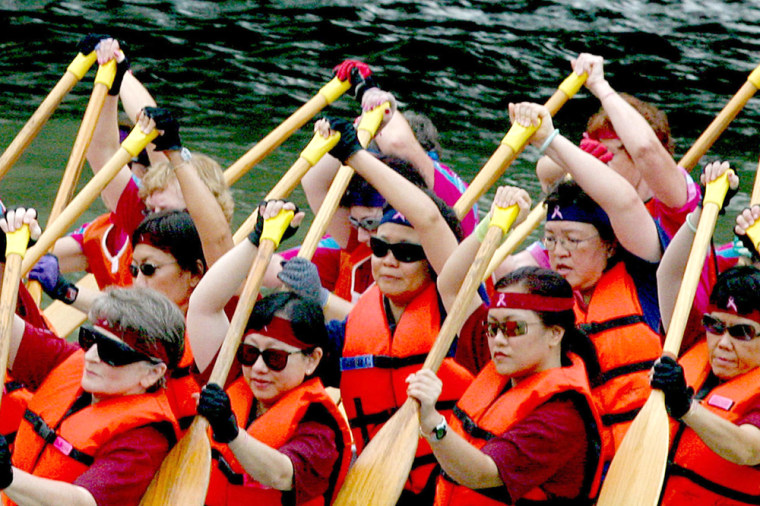Dragon Boat racing was hardly the hobby friends and family expected 62-year-old Kate Wong to pick up just months after undergoing surgery for breast cancer.
“At your age?” she recalled her friends asking when she told them she planned to join a crew of 20 women in races where they thrust paddles into the water in unison to the rapid pounding of a drum.
Some feared for her health, thinking that exercising her chest and arms so soon after surgery could be dangerous. But Wong went ahead and in January 2003 became a founding member of the Singapore Breast Cancer Foundation’s dragon boat program.
Billed as Asia’s first, the program puts women who have recently recovered from breast cancer into dragon boats, long flat water canoes, twice a week for grueling training sessions. It is thought that the training helps them heal physically and emotionally from the ordeal of breast cancer.
Benefits of exercise
Fears that regular strenuous paddling could be harmful are unfounded, doctors say. In fact, it can be beneficial.
“Upper body exercise, especially for the arms, helps to promote the drainage of lymphatic fluid from the arms,” said Dr. Ang Peng Tiam, a consultant medical oncologist with Singapore’s Mount Elizabeth hospital.
“This reduces the risk of arms swelling that sometimes occurs in breast cancer patients after surgery,” Ang said.
Breast cancer patients who are at least three months out of treatment are encouraged to join the program.
Members say that in addition to being physically stronger, they feel more confident and less ashamed of their illness.
“Breast cancer is something you sweep under the carpet,” said 60-year-old Esther de Silva, another founding member of the Singapore team. “If you have it, you don’t tell the world. You feel so ashamed. Because of this support group, we have learned to open up.”
The Singapore team now has 44 members and recently held its first competition, the Singapore River Regatta, facing off against a visiting team from Vancouver, Canada.
Around the world
The Canadian team was the world’s first to be established, inspired by a 1996 study by Dr. Don McKenzie, a sports medicine physician from the University of British Columbia. The study was the first to show that repetitive movements helped breast cancer survivors.
The Vancouver team, who call themselves Abreast in A Boat, now has 150 members and six crews and has helped spawn another 50 sister societies around the world.
At the riverside, the women, adorned with stick-on dragon tattoos and headbands decorated with their trademark pink ribbon, made their way into the boats. Many clutched tight to their paddles, beset by competition jitters.
Family members and friends stood by and even paddled alongside in a show of support. Many wives recruited their husbands to be waterboys and cheerleaders, referring to them affectionately as “spouseboys.”
The more experienced Canadian team beat the two novice Singapore teams, but the paddlers say they scored a victory of another sort.
Support team
“We are all in the same boat,” said Jane Frost, 55, a member of the Vancouver team. “We are all pulling together.”
Frost said the races give survivors a chance to talk and share strategies on how to move on with life after cancer.
Breast cancer is the most common form of cancer among Singaporean women and its incidence has doubled in the past 20 years.
According to the Singapore Breast Cancer Foundation, between 700 and 1,000 new cases are reported here each year. Experts are puzzled by the rise in the number of cases but suspect it is related to changes in diet and lifestyle, according to the foundation’s Web site.
The incidence of breast cancer in the United States also has increased, something experts attribute partly to increased mammogram use and early diagnosis.
Asians who live in Western societies are reported to have a higher incidence of breast cancer than those in native countries. Singapore, a wealthy Southeast Asian city-state of 4 million residents, is among Asia’s most westernized societies.
The paddlers hope their races will help raise breast cancer awareness and reduce the social stigma often attached to the disease.
“The creation of a breast cancer dragon boat team in Singapore is an important step toward our goal of raising awareness of breast cancer in Asia,” said Cheryl Watson, team captain of Abreast in A Boat.
The gatherings also build confidence.
“Seeing our family members astonished at how we could take control of our lives again gave us comfort and hope,” Frost said.
